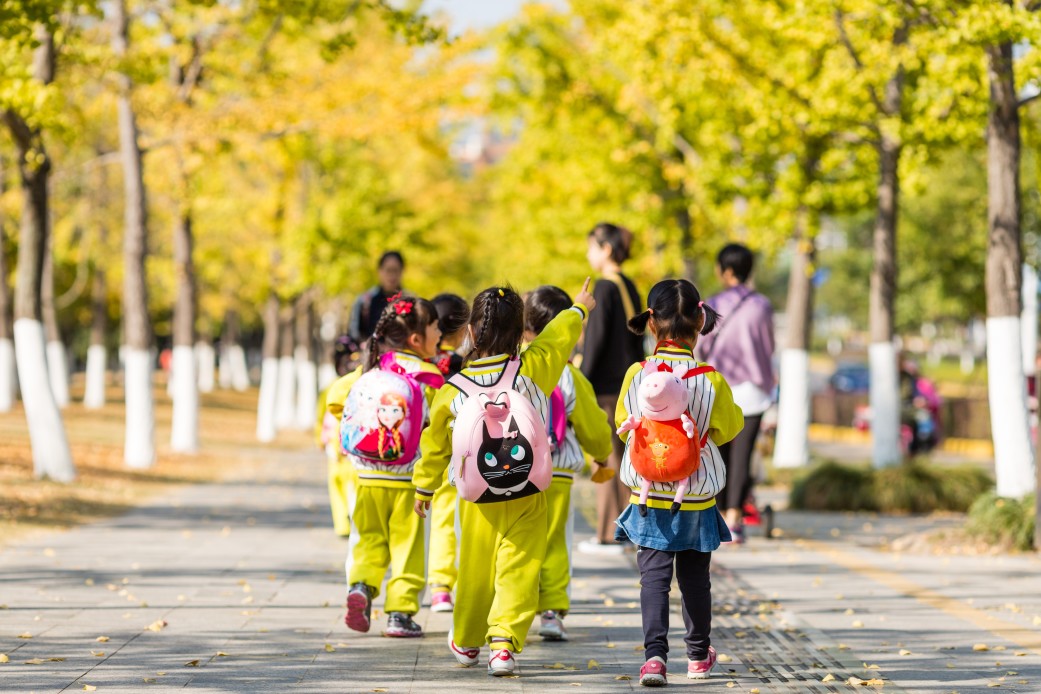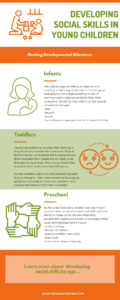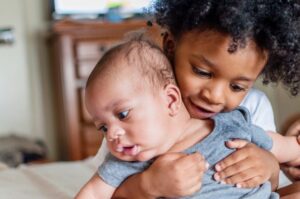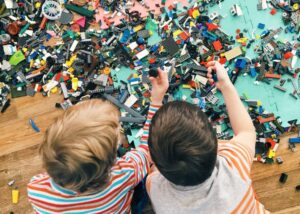Children’s social skills are an integral part of their development, especially as they enter daycare and preschool. When children are entering daycare or preschool, they need to effectively communicate and socialize with other children, teachers, and other adults, outside of their household’s immediate family members. Aside from having extra help, daycare is an excellent way to socialize your children.
At daycare, kids learn what it means to be part of a community where they can make friends, learn how to interact, play, and treat other people. Getting kids out of their familiar family dynamic, especially at a young age, will help give them a leg up on socializing and learning how to behave in social situations. Regardless of your young child’s age, there are steps you can take to better prepare your children by helping them improve their social skills. In this comprehensive guide, we will break down different ways to improve children’s social skills from infant care ages, toddler care ages, and even preschool-aged children.
Learning Social Skills for Daycare
Social skills are used every day to interact and communicate with others and are especially crucial for growing and developing children. When children are young and unable to speak, they learn how to communicate first in their household and then secondly, in an outside social setting like infant care, toddler care, or preschool.
When in infant care, children use non-verbal communication like facial expressions and gestures to communicate. As children learn more words, they can have better verbal communication but continue to partake in non-verbal communication through body language and speech, which will be essential when they are at daycare. When communicating with others, there are rules for how children should be socializing. Infant care, toddler care, or preschool settings where children are involved in the play and communicating with other children are excellent for improving socialization.
The Importance of Social Skills
Social skills are essential so children can not only effectively communicate with others, but can also learn how to have positive interactions. Socialization skills are essential in making friendships in school or toddler care. There is no doubt that children will run into conflicts, especially at a young age. Still, when you find yourself in a scenario of two children fighting over a toy they both want to play with, you can take the opportunity to use this as a lesson in conflict resolution aiding in improved social skills.
Being in a social setting like daycare allows for these interactions to occur, so children can learn firsthand what it means to communicate clearly, talk nicely to others, and take direction from teachers and parents. In this guide, we will break down ways to improve social skills for different age groups:
- Infant
- Toddlers
- Preschoolers
In infant care, babies will soak up everything from their environment, including voices, music, facial expressions, and other sounds. Aside from the evident social skills children will learn in daycare, school, or being around other children, there are also other tools to teach and encourage effective communication, growth, and development.
When your little ones are too young to engage in verbal communication, there are other options to consider to encourage nonverbal communication. Breakie Bunch teaches sign language and finds that this tool is handy in communicating with young children. Emotional learning plays a big part in socialization as children learn routine and accepted behaviors. When children learn emotional intelligence to better handle their frustrated feelings or when dealing with conflict resolution, they can make better choices as they grow up and are exposed to different situations. The building blocks of social skills start right at birth – first, let’s learn about infant care social skills.
Infant Social Skills
The critical stage of infancy is so important in creating a nurturing environment. Just because children are young does not mean they cannot learn; in fact, they are learning so much each day. Your child doesn’t have to be in infant care to start an excellent curriculum for learning. Here are some ways to help stimulate your infant care aged-child and help them to learn at home, that can also be passed onto your infant caregiver:
- Play with sight, sound, and texture
- Teach babies age-appropriate sign language
- Read books and use inflection to introduce the ways that the voice can change
As parents and caretakers engage with infants, whether at home or in infant care, through talking, playing, reading, or singing, the infant is stimulated and excited to learn by your facial expressions, voice, gestures, and more. When in infant care, children will learn, grow, and develop the simple building blocks of communication and socialization from their caregivers. Infants use these building blocks to learn language, motor skills, and social skills to help them enter toddler care or other social situations with children.
Toddler Social Skills
When children who are 1-2 years old get ready to go off to toddler care, they will be introduced to a daily routine similar to school. You can prepare your child for toddler care by helping them to improve their social skills at home. Once children have a routine established and can learn, play, and communicate well with the household members, there is a better chance that they will adapt more quickly to a new environment with new children. If your children are still apprehensive about their new daycare, don’t worry, we are here to help.
Here are some tips you can incorporate into your at-home routine to help improve your toddler’s social skills before entering toddler care: begin necessary communication and socialization as well as teaching children how to understand their own emotions.
At home, you can teach your children to vocalize their feelings. Repeating back to your toddler what you understand them to say or rephrasing their statement to help them make more sense to others is a significant step toward better communication.
Before entering toddler care, toddlers’ socialization comes in the form of playdates – but children don’t necessarily need to actively play with other children to start to form these skills. Consider taking your child to the park or a gym where other children are in the same area. Parallel play means that kids play next to one another instead of with each other. This type of play is encouraged and will lead to further interaction and group play.
Teaching children how to understand their own emotions and express them effectively will go a long way once they are in daycare. Instead of crying or whining, encourage children to use their words and point to what is bothering them. When in toddler care, there will be many children around each other, and they will need to learn how to express their emotions and manage their friendships in this new environment.
Introducing critical social skills like sharing, cooperating, listening, and respecting others and their personal space will go a long way in daycare or preschool. At Breakie Bunch daycare, we provide a healthy learning environment for infant care, toddler care, and preschool. We provide plenty of opportunities for children to have socialization through play, whether in groups or playing independently.
Suppose your child is not yet in daycare. In that case, you can use these guidelines for social developmental milestones to improve socialization and other communications in the home before your child goes off to toddler care or preschool.
Preschool Social Skills
Once babies have learned simple skills from their parents or infant caregiver, they start to grow and prepare for preschool. Kids are usually 3-4 years old when entering preschool and are curious, excited, and ready for a lot of fun. Children are practicing sharing, using manners, following directions, and taking on responsibility. With these tasks, conflicts may arise that can be resolved in the home or at toddler care. The critical thing to note is that the environment should be warm, loving, and ready to help solve conflicts that arise from lack of communication.
In preschool, children are learning to practice their social and emotional skills with the ability to make good choices while they experiment, explore, and prepare for Kindergarten. You can help your preschool-aged children improve their social skills by allowing them to express their feelings and opinions. Teaching respect for others will go a long way as children learn to resolve conflicts more independently, but will still have teachers to lean on for help. Follow these tips to improve social skills for your preschool-aged children, whether at home or in daycare:
- Schedule play dates so children that are task-oriented learn to play well with other children.
- Encourage positive interactions with other children.
- Teach them how to listen actively.
- Encourage children to make new friends.
- Give them tasks to practice following directions.
- Give them small conflicts to practice resolutions.
- Encourage communicating their emotions.
Preschool is so essential for teaching your child social play, structure, motor skills, and empathy. When you start to pick a preschool, consider the different activities that schools offer to aid in socialization and independence for your child. Check out more information on how preschool impacts the social development of children in toddler care.
Developmental Toys
While children are playing at home, in infant care, toddler care, or at school, you can encourage growth and development by choosing the right types of toys. Decorated boards and sensory boards are excellent items for toddler-care-aged children when playing. These toys come with latches, switches, and knobs that are great for curious kids. These busy boards naturally encourage children to practice their fine-tuning motor skills. Here are some of our favorite development toys:
- Wooden Rainbow Stacker Nesting Blocks
- Magnetic Building Blocks
- No-Mess, Non-Toxic Playfoam
- Smart Kids Musical Instrument Set
Sensory play involves touching, smelling, and improving children’s social skills by playing with texture. Sensory and developmental toys are critical at the infant care stage as well. Here are twenty sensory play ideas for babies at-home or in infant care.
Parenting Tips
When young children cannot communicate their feelings or emotions effectively, it leads to frustrations for both the child and adults. These tips aim to assist in effective communication for parents so you can learn how to stay positive while teaching your children important lessons:
- Urge children to use their words to express their feelings instead of hitting, slapping, or stomping their feet.
- Encourage positive behavior by rewarding or complementing children when you see them doing good and behaving well.
- Help children articulate their thoughts and feelings more effectively by providing the words they need for complex emotions.
No matter what age your children are, staying positive will go a long way, even in infant care. Not only does being a positive adult give you a closer bond with your child, but you will feel less stressed in teaching your child these skills that are necessary to produce a respectful and thoughtful adult. Ensure your child knows and feels that the home is a safe and comfortable space for them to express themselves without backlash or negativity. A positive learning environment will help children focus on the developmental and social skills necessary for positive toddler care or preschool experience.
Breakie Bunch Daycare
Finding the right daycare is essential and will be one of the first environments that your children can make friends, learn how to interact, play, and treat other people. This environment will get kids out of their familiar family dynamic and introduced to a whole new world of socialization, learning, and interacting in social situations.
Daycare plays a huge, positive role in child development, including the social skills learned at very young ages in infant care to older children in daycare. From at-home to preschool, communication and socialization skills are crucial for children to learn as they grow, develop, and learn more about themselves, others, and the world. Whether you seek care for your infant baby or services for toddler care, we know how important it is to find a place you trust.
Quality daycare or preschool will not only care for your child while you are away, but they will also provide many educational benefits. If you are looking for a trusted center for your infant care or toddler care in the Waterford or Goodrich area, check out Breakie Bunch’s daycare offerings.




